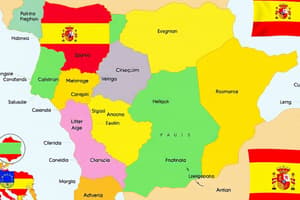Podcast
Questions and Answers
How do you form the plural of nationality adjectives that end in 's'?
How do you form the plural of nationality adjectives that end in 's'?
You can make them plural by adding 's', such as 'Russians' or 'Brazilians'.
When should you use the definite article 'the' with nationality adjectives that have specific endings like '-ch' or '-sh'?
When should you use the definite article 'the' with nationality adjectives that have specific endings like '-ch' or '-sh'?
You should use 'the' to refer to the population as a whole, for example, 'the French' or 'the British'.
Identify one nationality that uses the noun form to refer to the population, such as 'Danish' referring to 'Dane'.
Identify one nationality that uses the noun form to refer to the population, such as 'Danish' referring to 'Dane'.
An example is 'Finnish', which refers to 'Finns'.
What is the correct term for a single individual from Switzerland, following the provided nationality rules?
What is the correct term for a single individual from Switzerland, following the provided nationality rules?
Signup and view all the answers
How do you refer to the population of people from Nepal in proper form?
How do you refer to the population of people from Nepal in proper form?
Signup and view all the answers
When speaking of the British population, what forms can you use to refer to them?
When speaking of the British population, what forms can you use to refer to them?
Signup and view all the answers
What is the appropriate title for a female individual from Italy?
What is the appropriate title for a female individual from Italy?
Signup and view all the answers
Using the rules provided, how would you refer to a group of male individuals from Japan?
Using the rules provided, how would you refer to a group of male individuals from Japan?
Signup and view all the answers
What is the plural form of 'a Scot' to refer to the population?
What is the plural form of 'a Scot' to refer to the population?
Signup and view all the answers
How is the population of individuals from Turkey correctly referred to?
How is the population of individuals from Turkey correctly referred to?
Signup and view all the answers
Study Notes
Countries, Nationalities, Languages
- Each country has associated adjectives, terms for people, nations, and languages.
- Albania: Albanian (adjective), Albanian (person), the Albanians (nation), Albanian (language)
- Algeria: Algerian, Algerian, the Algerians, Arabic and French (languages)
- Argentina: Argentinian, Argentinian, the Argentinians, Spanish
- Australia: Australian, Australian, the Australians, English
- Austria: Austrian, Austrian, the Austrians, German
- Azerbaijan: Azerbaijani, Azerbaijani, the Azerbaijanis, Azerbaijani
- Belgium: Belgian, Belgian, the Belgians, French, Dutch, German
- Brazil: Brazilian, Brazilian, the Brazilians, Portuguese
- Canada: Canadian, Canadian, the Canadians, English and French
- China: Chinese, Chinese, the Chinese, Mandarin
- France: French, French, the French, French
- Germany: German, German, the Germans, German
- India: Indian, Indian, the Indians, Hindi and English
- Iran: Iranian, Iranian, the Iranians, Persian
- Italy: Italian, Italian, the Italians, Italian
- Japan: Japanese, Japanese, the Japanese, Japanese
- Mexico: Mexican, Mexican, the Mexicans, Spanish
- Russia: Russian, Russian, the Russians, Russian
- United Kingdom: British, Briton, the British, English
- USA: American, American, the Americans, English
- Nationality adjectives often change based on gender (e.g., Frenchman/Frenchwoman, Dutchman/Dutchwoman).
- Notes on terms:
- "Scotch" is reserved for specific items, while "Scottish" refers to people and culture.
- "Arabic" is for the language, while "Arab" describes the people; "Arabian" applies to certain place names and expressions.
- For some nationalities, plural forms can be made by adding ‘s’ (e.g., Russians, Brazilians).
- Many nationality adjectives require the definite article ‘the’ for general population references (e.g., the Irish, the Swiss).
- Specific noun forms exist for some adjectives and represent people from those nations (e.g., Dane for Danish, Scot for Scottish).
Key Grammar Notes
- Use of definite articles:
- Some nationality adjectives use 'the' to refer to the population (e.g., the Chinese, the French).
- Plural forms with definite articles apply to specific terms (e.g., the Danes).
- Gender distinction is important when referring to individuals (e.g., a French woman vs. an Italian).
- Language is integral to a country's identity, oftentimes reflecting historical and cultural ties.
Summary of Nationality Variations
- Nationalities can take on various forms based on context, especially in plural and gender distinctions.
- Knowledge of these variations enriches understanding of cultural nuances and linguistic precision in English usage.
Studying That Suits You
Use AI to generate personalized quizzes and flashcards to suit your learning preferences.
Related Documents
Description
Test your knowledge on countries, nationalities, and languages with this engaging quiz. You will learn about the adjectives used for different nationalities as well as the languages spoken in each country. See how well you know the world's diverse cultures!




